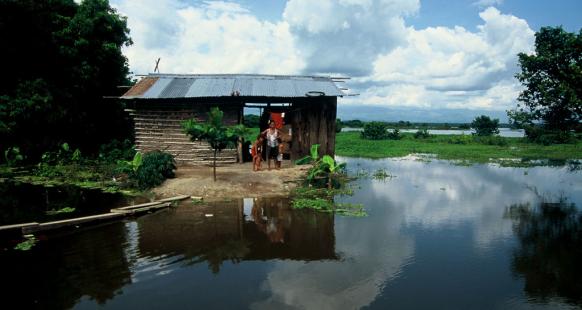Overcoming Challenges in a Shifting Landscape - Building Resilience
Resilience is based on complex connections between social, environmental, and economic domains.
Building resilience has and continues to be central to the human endeavor. Extreme events have caused harm, shock, and suffering for centuries. At the same time, they have stimulated innovation, technological advancements, and adaptation—hallmarks of resilience under challenging circumstances.

In today's world marked by greater uncertainty and vulnerability, building resilience is even more important in. The frequency and severity of shocks has increased. Trends have become clearer because of our ability to track crises over time. Statistics of human loss and suffering are shocking and call for urgent action. Between 2004 and 2013, natural disasters alone affected on average around 200 million every year; a number that that dropped to 155 million in 2014 and 98.6 million in 2015, according to the Center for Research on the Epidemiology of Disasters.
Not surprisingly, efforts to build resilience are reflected in many development initiatives, including the policies, strategies, and operations of the World Bank Group. As part of our mandate to assess the performance of the World Bank Group, the Independent Evaluation Group has in recent years evaluated programs specifically designed by the Bank Group to respond to crises, such as the 2007-08 food price spike, the 2008 economic crises, or pandemics like avian influenza. In addition, our evaluations have covered programs that focused on building resilience in better times to manage, for example, social safety nets or disaster risk reduction programs. We have not evaluated the totality of the World Bank Group's efforts to build resilience; a task that could not be addressed in just one evaluation.
Instead, to contribute to this year's Spring Meetings of the IMF and World Bank Group, we recently released a new report, Crisis Response and Resilience to Systemic Shocks: Lessons from IEG Evaluations. The report synthesizes existing evaluations to identify common insights from response strategies to different kinds of shocks. In doing so, we recognized that the need for resilience overlapped among, for instance, economic, social and environmental spheres. Importantly, none of them are isolated from each other—critical interdependencies exist.
Some of the lessons are simple and intuitive:
- Preparedness is essential. And that includes necessary data collection and analytics as well as building response capacities in good times for bad times;
- Deploying a range of instruments flexibly. In any crises situation, it is essential to have the right instruments at hand. Too often, steady times see emergency response tools "disappear in the closet" with too much time needed to activate them in times of unexpected change.
- Global partnerships are crucial. They provide the platform to find a shared understanding of issues, mobilize minds and money, and galvanize action.
- Leading locally with international support. Ownership of crisis response is essential for their effectiveness. International partners have to work to support and coordinate their efforts with local leadership.
And: these lessons are "nothing new". Unfortunately, evaluations continue to find that these challenges have not been overcome, these lessons have not been internalized. Critically, in addition to these simple lessons, we will need to develop a better understanding of interdependencies across different spheres of vulnerability to ensure strengthening one area will not weaken another. Instead, resilience has to be built with a recognition of complex connections between social, environmental, and economic domains.
As adaptive management is essential for a resilient humanity, there is greater need to learn to learn, to monitor and change strategies or tactics, to reflect and assess what has worked and why. Self- and independent evaluation play critical roles in these contexts.
At our event at the World Bank Group and IMF's Spring Meetings our panelists debated what they have learned about building resilience and what it will take to reach the next level. If you missed the panel discussion, here's a recording of the event:
The blog post originally appeared on the World Bank IEG blog.



